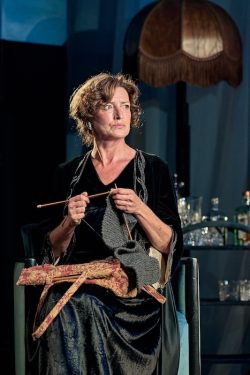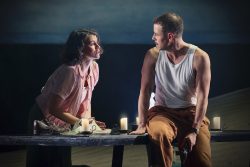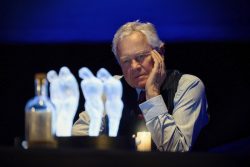 ALTHOUGH Agatha Christie’s 1939 novel was highly successful, with more than 100 million copies sold, she considered the ending to be a little too dark for theatre-goers to accept, and so changed it to the less bleak one most of us know, and was used in Rene Clair’s atmospheric film version in 1945. Director Lucy Bailey and the Royal Derngate & Northampton producers firmly believe that Mrs Christie had the balance right in the novel, being of the opinion that, since the first stage presentation in 1943, audiences have become more prepared to accept that original, and bleak, ending.
ALTHOUGH Agatha Christie’s 1939 novel was highly successful, with more than 100 million copies sold, she considered the ending to be a little too dark for theatre-goers to accept, and so changed it to the less bleak one most of us know, and was used in Rene Clair’s atmospheric film version in 1945. Director Lucy Bailey and the Royal Derngate & Northampton producers firmly believe that Mrs Christie had the balance right in the novel, being of the opinion that, since the first stage presentation in 1943, audiences have become more prepared to accept that original, and bleak, ending.
Certainly, Lucy Bailey gives no quarter to softening any of the characters, or to the brutally realistic ending. All ten of her prospective victims or murders, or their mysterious host Mr U.N.Owen, lurking in the undergrowth of the isolated Soldier Island to which they have all been lured, are real people, no cardboard cut-outs here.
As in turn they all admit, mostly without regrets, that through malice or poor judgement they have caused the death of one or more people, your sympathy and/or suspicion moves from one suspect to another. And, as the field narrows until we are left with the final two, many of those suspects have already bitten the dust.
 Of course it must be mine host, hiding from sight, who has been striking each victim, or perhaps that boatman Fred Narracott [Matt Weyland] who brought them over to the island. If not who? – one of the already engaged servants, the moody housekeeper [Lucy Tregear] or perhaps her neurotic friend the cook [Nicola May-Taylor]. Surely not that nice new secretary Vera Claythorne [Sophie Walter], the dashing colonial ex-officer Captain Philip Lombard [Joseph Beattie], or the wonderfully calm, erudite former judge Wargrave [David Yelland]? More likely to be the Bible-quoting spinster Emily Brent [Katy Stephens], or the guilt-ridden General Mackenzie [ Jeffery Kissoon], or reformed alcoholic surgeon Dr Armstrong [Bob Barrett], or devil-take-the-hindmost careless driver Anthony Marston [Oliver Clayton], or perhaps the uncouth bullying former policeman William Blore [Andrew Lancel].
Of course it must be mine host, hiding from sight, who has been striking each victim, or perhaps that boatman Fred Narracott [Matt Weyland] who brought them over to the island. If not who? – one of the already engaged servants, the moody housekeeper [Lucy Tregear] or perhaps her neurotic friend the cook [Nicola May-Taylor]. Surely not that nice new secretary Vera Claythorne [Sophie Walter], the dashing colonial ex-officer Captain Philip Lombard [Joseph Beattie], or the wonderfully calm, erudite former judge Wargrave [David Yelland]? More likely to be the Bible-quoting spinster Emily Brent [Katy Stephens], or the guilt-ridden General Mackenzie [ Jeffery Kissoon], or reformed alcoholic surgeon Dr Armstrong [Bob Barrett], or devil-take-the-hindmost careless driver Anthony Marston [Oliver Clayton], or perhaps the uncouth bullying former policeman William Blore [Andrew Lancel].
One thing is certain. As the story evolves on Mike Britton’s slightly surreal set that uses high revolving gauze curtains to change the location, and aided by Chris Davey’s intelligent lighting each victim to stylistically exit the scene, your opinion (unless you have second sight, or have read the book) as to who is the perpetrator of these foul deeds will change several times throughout the evening.
 Only you, after a visit to Bath’s Theatre Royal, can say who is right – Agatha Christie for wanting to change the ending of her original story for the stage, or Lucy Bailey who, in believing that the original ending is far more powerful and packs a bigger dramatic clout, was correct in returning to it for this production.
Only you, after a visit to Bath’s Theatre Royal, can say who is right – Agatha Christie for wanting to change the ending of her original story for the stage, or Lucy Bailey who, in believing that the original ending is far more powerful and packs a bigger dramatic clout, was correct in returning to it for this production.
The tour continues to Plymouth’s Theatre Royal from 12th to 16th March, Truro Hall for Cornwall from 26th to 30th March and to Southampton’s Mayflower Theatre from 8th to 13th April.
GRP